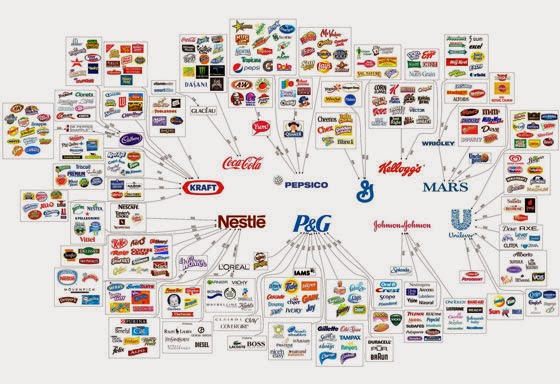 Melissa Melton
Melissa Melton
Activist Post
Being poor means a lot more these days than having less money to buy an Escalade and that third summer vacation home on the beach.
Try being able to afford buying healthy food in modern America.
Now a study in this month’s edition of Preventing Chronic Disease has shown that grocery stores tend to offer coupons cutting costs on its less than healthy fare, while rarely discounting the actual “good stuff”:
The study found that coupons offered by grocery stores often chop the costs of calorie-laden foods such as crackers, chips, desserts and sugary drinks. Relatively few markets discount lean meats, low-fat dairy products or fresh fruits and vegetables, the researchers said.
“We know from other studies that when you lower the price of foods, people buy more of them,” said study author Dr. Hilary Seligman, assistant professor in residence at the University of California, San Francisco, School of Medicine. “When junk foods are the foods stores are lowering the prices of, we shouldn’t be surprised that more of them are purchased.” (source)
By the way, when is the last time anyone saw a coupon for some fresh fruits or vegetables?
Even before discounts, it’s clear that heavily processed foods are far cheaper than whole, fresh foods in America. University of Washington obesity researcher Adam Drewnowski conducted a study on why the most reliable predictor of obesity is a lack of wealth. On behalf of The New York Times, Michael Pollan wrote:
Drewnowski gave himself a hypothetical dollar to spend, using it to purchase as many calories as he possibly could. He discovered that he could buy the most calories per dollar in the middle aisles of the supermarket, among the towering canyons of processed food and soft drink. (In the typical American supermarket, the fresh foods — dairy, meat, fish and produce — line the perimeter walls, while the imperishable packaged goods dominate the center.) Drewnowski found that a dollar could buy 1,200 calories of cookies or potato chips but only 250 calories of carrots. Looking for something to wash down those chips, he discovered that his dollar bought 875 calories of soda but only 170 calories of orange juice. [emphasis added]
So there you go. One big reason for this is clearly the Farm Bill, which heavily subsidizes crops in this country.
“You have a whole régime here that’s worked to increase agricultural efficiency,” Tillotson says. And what U.S. farmers are most efficient at producing, he says, are just a few highly subsidized crops—wheat, soybeans, and especially corn.
Support for these few crops, critics say, has compelled farmers to ignore other crops such as fruits, vegetables, and other grains. The market is flooded with products made from the highly subsidized crops, including sweeteners in the form of high-fructose corn syrup (HFCS), fats in the form of hydrogenated fats made from soybeans, and feed for cattle and pigs. This flood, in turn, drives down the prices of fattening fare such as prepackaged snacks, ready-to-eat meals, fast food, corn-fed beef and pork, and soft drinks. Worse yet, some scientists say, paltry support for foods other than these staples increases the contrast between prices of fat-laden, oversweetened foods and those of healthier alternatives, offering poor folks little choice but to stock their pantries with less nutritious foods.
 Much of the processed food in America is made with either GMO corn or soy. Why? It might have something to do with the fact that those are top subsidized crops in this country. If we are what we eat, it has been declared that Americans actually are corn and soy. The average American’s hair strand test shows that around 70% of our hair is made of the same carbon as corn (that same figure isn’t found in Europe, where people’s diets aren’t based on what the government is subsidizing their farmers to grow).
Much of the processed food in America is made with either GMO corn or soy. Why? It might have something to do with the fact that those are top subsidized crops in this country. If we are what we eat, it has been declared that Americans actually are corn and soy. The average American’s hair strand test shows that around 70% of our hair is made of the same carbon as corn (that same figure isn’t found in Europe, where people’s diets aren’t based on what the government is subsidizing their farmers to grow).
On top of that, even the Grocery Manufacturer’s Association reportedly admits that 80% of the food consumed in the U.S. is genetically modified (although that number seems a bit conservative when all the GM food additives such as high fructose corn syrup and soy lecithin are factored in).
Studies have shown that food grown without the use of all of the synthetic pesticides used on crops like those that are genetically modified actually are more nutritious (despite claims by Big Agra players like Monsanto and Dow, who regulated their own products and swear they are “substantially equivalent” to their non-modified counterparts).
One theory has to do with the fact that plants create cancer-fighting polyphenols in response to fighting off pests; if they are reliant on man-made chemical concoctions to do that job for them, the plants don’t create as many. A Sixth Circuit Court of Appeals even found that milk treated with the artificial bovine growth hormone rBGH is less nutritious as well.
However, store-bought organic food comes at a premium in this country, so take a guess at who is likely buying most of it. On the flip side, it’s no far stretch to say that most people who clip coupons are on a tight budget (to say the least).
You have to wonder whose interest it serves to literally promote people eating lower quality foods in this country…
For more on how grocery stores promote these kinds of products with coupons, check out this video from Truthstream Media:
Contributed by Melissa Melton of The Daily Sheeple, where this article first appeared.
Melissa Melton is a writer, researcher, and analyst for The Daily Sheeple and a co-creator of Truthstream Media. Wake the flock up!


Be the first to comment on "Study: Even Grocery Store Coupons Are Mostly Trying to Sell You Junk"